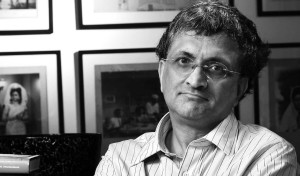Dr. Ramachandra Guha
Books on Environment
Environmentalism: A Global History
Allen Lane (October 2014)
An acclaimed historian of the environment, Ramachandra Guha in this book draws on many years of research in three continents. He details the major trends, ideas, campaigns and thinkers within the environmental movement worldwide. Among the thinkers he profiles are John Muir, Mahatma Gandhi, Rachel Carson, and Octavia Hill; among the movements, the Chipko Andolan and the German Greens.
Environmentalism: A Global History documents the flow of ideas across cultures, the ways in which the environmental movement in one country has been invigorated or transformed by infusions from outside. It interprets the different directions taken by different national traditions, and also explains why in certain contexts (such as the former Socialist Bloc) the green movement is marked only by its absence.
Massive in scope but pointed in analysis, written with passion and verve, this book presents a comprehensive account of a significant social movement of our times, and will be of wide interest both within and outside the academy. For this new edition, the author has added a fresh prologue linking the book’s themes to ongoing debates on climate change and the environmental impacts of global economic development.
The Unquiet Woods – Ecological Change & Peasant Resistance in the Himalaya
University of California Press, Revised edition (February 2000)
The Unquiet Woods, Ramachandra Guha’s path-breaking study of peasant movements against commercial forestry, it brings the story of Himalayan social protest up-to-date, reflecting the Chipko movement’s continuing influence in the wider world. A new appendix charts the progress of environmental history in India.
Savaging the Civilized – Verrier Elwin, His Trials & India
University of Chicago Press, (August 1999)
Verrier Elwin (1902-1964) was an influential non-official Englishman who lived and worked in 20th-century India. Elwin’s ethnographic studies and popular works on India’s tribal customs, art, myth and folklore continue to generate controversy. Described by his contemporaries as a cross between Albert Schweitzer and Paul Gauguin, Elwin was a man of contradictions, at times taking on the role of evangelist, social worker, political activist, poet, government worker, and more.
He rubbed elbows with the elite of both Britain and India, yet found himself equally at home among the impoverished and destitute. Intensely political, the Oxford-trained scholar tirelessly defended the rights of the indigenous and, despite the deep religious influences of St. Francis and Mahatma Gandhi on his early career, staunchly opposed Hindu and Christian puritans in the debate over the future of India’s tribals. Although he was ordained as an Anglican priest, Elwin was married twice to tribal women and enthusiastically (and publicly) extolled the tribals’ practice of free sex.
Later, as late Prime Minister Nehru’s friend and advisor in independent India, his compelling defence of tribal hedonism made him at once hugely influential, extremely controversial, and the polemical focal point of heated discussions on tribal policy and economic development.
This book is both biography and history, an exploration through Elwin’s life of some of the great debates of the 20th century: the future of development, cultural assimilation versus cultural difference, the political practice of postcolonial as opposed to colonial governments, and the moral practice of writers and intellectuals.
Social Ecology (Sociology and Social Anthropology)
OUP India (January 1998)
A collection of pioneering essays. With the growing awareness of the causes and consequences of environmental degradation, the field of social ecology has assumed enormous importance. This reader provides a `state of the art’ survey of the field.
Profile
Ramachandra Guha is a historian and biographer based in Bangalore. He has taught at the universities of Yale and Stanford, held the Arné Naess Chair at the University of Oslo, and been the Indo-American Community Visiting Professor at the University of California at Berkeley. In the academic year 2011-2 he served as the Philippe Roman Professor of History and International Affairs at the London School of Economics.
Guha’s books include a pioneering environmental history, The Unquiet Woods (University of California Press, 1989), and an award-winning social history of cricket, A Corner of a Foreign Field (Picador, 2002). India after Gandhi (Macmillan/Ecco Press, 2007) was chosen as a book of the year by the Economist, the Washington Post, the Wall Street Journal, the San Francisco Chronicle, Time Out, and Outlook, and as a book of the decade in the Times of India, the Times of London, and The Hindu. His most recent book is Gandhi Before India (Knopf, 2014), which was chosen as a notable book of the year by the New York Times. His other books on environment are Environmentalism: A Global History (Penguin UK, 2014), Savaging the Civilized (Oxford University Press, 1999) and Social Ecology (Oxford University Press, 1998).
Apart from his books, Guha also writes a syndicated column that appears in six languages in newspapers with a combined readership of some twenty million. Guha’s books and essays have been translated into more than twenty languages. The New York Times has referred to him as ‘perhaps the best among India’s non-fiction writers’, Time Magazine has called him ‘Indian democracy’s pre-eminent chronicler’.
Ramachandra Guha’s awards include the Leopold-Hidy Prize of the American Society of Environmental History, the Daily Telegraph/Cricket Society prize, the Malcolm Adideshiah Award for excellence in social science research, the Ramnath Goenka Prize for excellence in journalism, the Sahitya Academy Award, and the R. K. Narayan Prize. In 2009, he was awarded the Padma Bhushan, the Republic of India’s third highest civilian honour. In 2014, he was awarded an honorary doctorate in the humanities by Yale University.
(sourced from http://ramachandraguha.in/)



